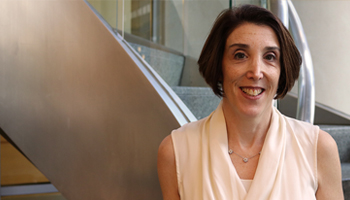HOW CAN WE HELP YOU? Call 1-800-TRY-CHOP
In This Section
Research Family Partners Program Brings New Dimension to Research Studies
 Editor’s Note: Our guest blogger, Amy Kratchman, has been working with clinicians and researchers since 2008 as a family representative. She is the mother of three children with special healthcare needs. As a senior research family consultant at Children’s Hospital of Philadelphia, Kratchman co-leads numerous family-centered care initiatives in the Research Institute. She collaborates with senior hospital leaders and staff to ensure that the institution’s research goals include meaningful engagement of families to ensure investigators are conducting research that is important to the needs of children and families. Kratchman leads Research Family Partners, an innovative program developed and implemented at CHOP, to maximize the meaningful engagement of families in all aspects of the research.
Editor’s Note: Our guest blogger, Amy Kratchman, has been working with clinicians and researchers since 2008 as a family representative. She is the mother of three children with special healthcare needs. As a senior research family consultant at Children’s Hospital of Philadelphia, Kratchman co-leads numerous family-centered care initiatives in the Research Institute. She collaborates with senior hospital leaders and staff to ensure that the institution’s research goals include meaningful engagement of families to ensure investigators are conducting research that is important to the needs of children and families. Kratchman leads Research Family Partners, an innovative program developed and implemented at CHOP, to maximize the meaningful engagement of families in all aspects of the research.
Patients and families are at the heart of our research at Children’s Hospital of Philadelphia Research Institute. Now, they’re also at the pulse, participating in all phases of research projects, from the grant proposal to the dissemination of research findings. I’d like to introduce you to a new program called Research Family Partners that is helping to ensure that the patient and family voice is as vital to research as its methodology.
While our researchers always have conducted studies that they believe will advance pediatric care, in recent years, key agencies that fund research such as the National Institutes of Health, the Agency for Healthcare Research and Quality, and the Patient-Centered Outcomes Research Institute have begun asking a pertinent question: How do investigators know if this research will be important to the patients’ and families’ lives that it affects? The answer also is key to our mission at CHOP of delivering patient and family-centered care.
CHOP has long been a leader in patient and family-centered care, with the creation of a Family Advisory Council in 1996. Since then, our family volunteers have played an integral role in all of the work we do throughout the hospital. They are valued partners who bring diverse viewpoints that influence many aspects of patients’ experiences such as our buildings’ playful design or how we implement patient safety policies during flu season.
The Research Family Partners program promotes this same high level of patient and family engagement to achieve the best and safest research outcomes. It is a valuable resource that any researcher at CHOP can utilize. So far, we have about 25 Research Family Partners who contribute authentically to the development and conduct of research studies, and our number of volunteers continues to grow with the heightened demand to involve patients and families in research in a meaningful way.
The most frequent request that we receive is to create a family advisory group specific to a study. In this role, Research Family Partners present their various perspectives to help guide the research team. They give first-line information to make certain research is useful to patients and families.
 Housed in our Clinical Research Support Office, the Research Family Partners program is available to recruit and orient families into research projects, and we provide them training and mentorship. We explain the project’s background and implications, how the research process works, and clearly define their roles and expectations. Since our families come from all different professional backgrounds and levels of education, we help the research teams translate some of the acronyms and terminology into “layman’s terms.”
Housed in our Clinical Research Support Office, the Research Family Partners program is available to recruit and orient families into research projects, and we provide them training and mentorship. We explain the project’s background and implications, how the research process works, and clearly define their roles and expectations. Since our families come from all different professional backgrounds and levels of education, we help the research teams translate some of the acronyms and terminology into “layman’s terms.”
The first time I joined a study team as a Research Family Partner, it honestly was a little intimidating to ask questions in front of a room filled with other research stakeholders, including clinicians, researchers, patient advocates, and policymakers. As I mentor new Research Family Partners, I help them to feel comfortable with speaking up because they have unique insights that study teams want to hear. In their daily lives, patients and families encounter the health challenges and concerns that researchers are trying to solve, so their firsthand experiences can be critical to helping the group understand a study’s feasibility and think about ways that could improve its likelihood of success.
The value of our Family Research Partners’ voice and feedback has been tremendous. We hear this anecdotally through our CHOP research teams, who tell us they see a new dimension of the health conditions they study: the family’s lived experience. Through this lens, research teams are able to develop novel approaches for evaluating health outcomes and ask research questions that are relevant to families.
For instance, a researcher studying autism spectrum disorder (ASD) might start out asking, “What problems would you like your child’s treatment to address?” With an approach informed by Research Family Partners, the question could evolve to become more specific and take into consideration where the child spends most of the day: “How does your child’s ASD impact his/her life at school and how he/she communicates with teachers and friends?”
CHOP Research Institute has become a leader in this growing area of engagement in research. I co-developed an interactive on-line training program called FYREworks which is an essential part of the Research Family Partners program. This resource helps patients and families participate on a research team and feel comfortable with being an active member providing their expertise. Other institutions have been seeking our advice on how to incorporate the patient and family voice in research, as they are just beginning this journey. We also have advised national pediatric research networks on how to start creating patient and family engagement committees.
We have established an easily accessible group of Research Family Partners who we can match to meet researchers’ specific study needs. If we do not have a Research Family Partner on board who has knowledge of the diagnosis that is being studied, we have connections with many pediatric disease advocacy groups and can help researchers find families who want to become more involved in research endeavors.
Gone are the days when patients and families were considered to be “research subjects.” We’ve created a community where patients and families are true research participants collaborating as partners with researchers to produce reliable study findings that make a difference for our children.
For more information about our Research Family Partners Program, please contact Amy Kratchman at kratchmana [at] email.chop.edu (kratchmana[at]email[dot]chop[dot]edu).


